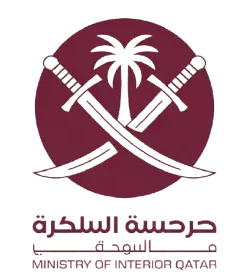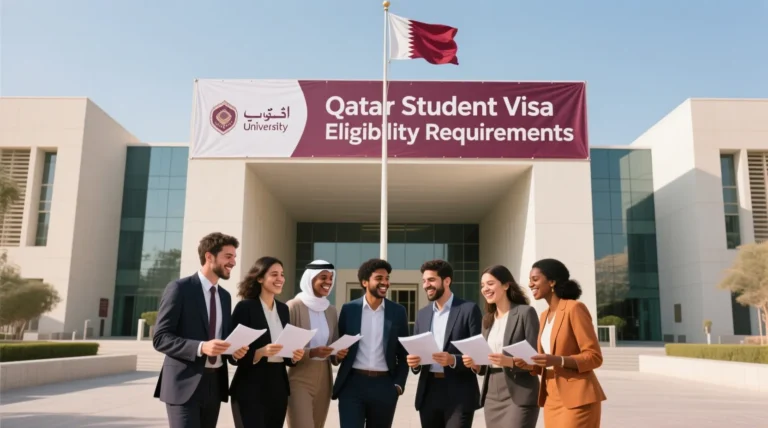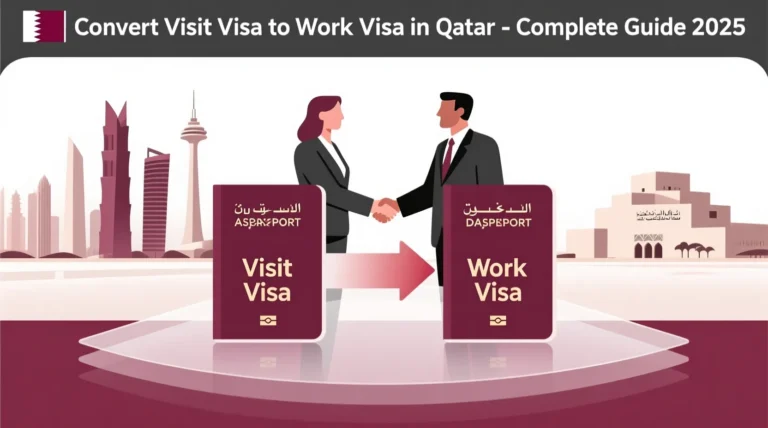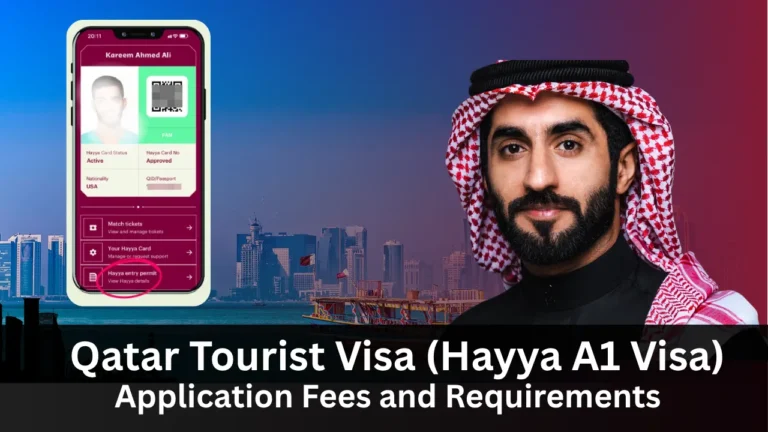Thinking about working in Qatar as a freelancer? The country’s evolving visa programs, including the Mustaqel and Azad visas, offer a unique way for skilled professionals to live and work independently. Unlike traditional work visas tied to companies, these freelance visas let you provide services across sectors like IT, marketing, design, and media. However, navigating eligibility, sponsorship rules, and legal obligations can be tricky if you don’t know the system well.
In this guide, we break down the entire process, share real-world tips, and highlight what you need to avoid costly mistakes. By the end, you’ll understand how to apply confidently and work legally in Qatar as a freelancer.
What is a Freelance Visa?
A freelance visa is a special type of permit that allows individuals to work independently without being tied to a single employer. It is designed for professionals, creatives, and skilled workers who want to offer their services to multiple clients or companies. The main purpose is to give freedom, flexibility, and legal authorization to work while living in a foreign country.
Unlike a general work visa, which requires sponsorship from a specific company and limits you to a single employer, a freelance visa allows you to operate across different sectors. For example, a graphic designer or IT consultant can legally serve multiple clients under one freelance visa, without the constraints of company employment rules. This makes it ideal for freelancers, entrepreneurs, and digital nomads seeking independence in markets like Qatar.
What is a Qatar Freelance Visa?
The Qatar Freelance Visa is a legal permit that allows skilled professionals to work independently in the country without being tied to a specific employer. Qatar has recently introduced programs like the Mustaqel Visa and the Azad Visa, designed to attract talent in sectors such as IT, media, design, marketing, and consultancy. These visas aim to provide flexibility for freelancers, entrepreneurs, and self-employed professionals while ensuring compliance with Qatari labor laws.

The Mustaqel Visa is a part of Qatar’s evolving residency and work programs. It allows freelancers to live in Qatar long-term and operate independently, with the possibility of family sponsorship, opening bank accounts, and accessing government services. Similarly, the Azad Visa offers short-term freelance options, mainly targeting professionals who want to work on specific projects or contracts.
In terms of legal recognition, both visas are officially sanctioned under Qatar’s labor and immigration regulations, distinguishing them from unofficial freelance arrangements, which can carry severe penalties. While the system is still evolving, these programs offer a clear, lawful pathway for freelancers to establish themselves in Qatar, making it one of the most attractive destinations in the Gulf for independent professionals.
Eligibility Criteria for Qatar Freelance Visa
Not everyone can apply for a Qatar Freelance Visa. The program is designed for professionals who meet specific requirements in terms of nationality, skills, experience, and legal standing. Applicants must be at least 18 years old and hold qualifications or experience relevant to their sector. While Qatar does not restrict applications strictly by nationality, priority is often given to skilled workers in high-demand fields such as IT, digital marketing, design, media, consulting, and other specialized professions.
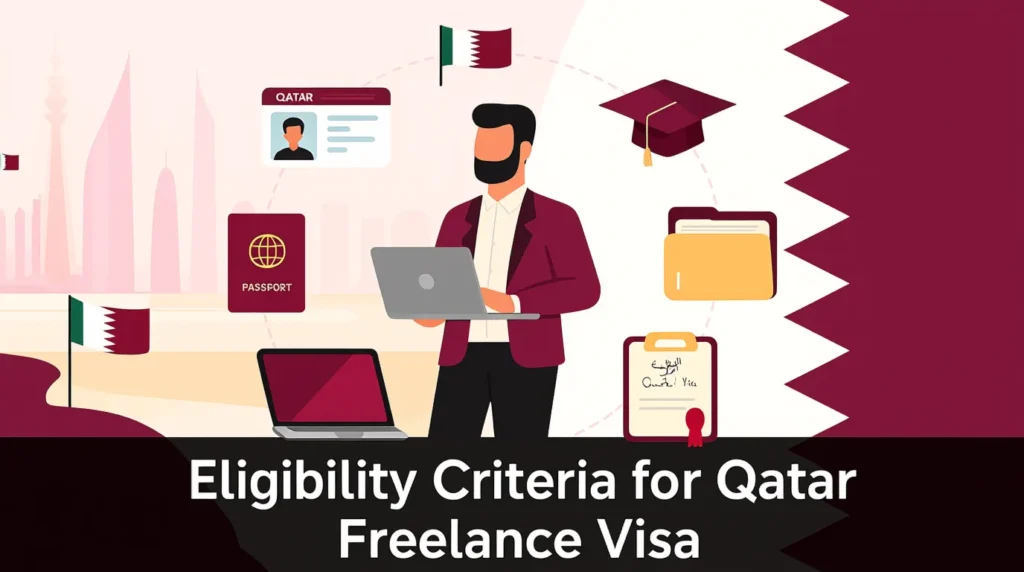
To qualify, you must demonstrate professional experience or education that proves you can operate independently. Freelancers with a strong portfolio, project history, or certifications have a higher chance of approval. Certain sectors, like software development, digital marketing, creative design, and engineering, are considered high-value for Qatar’s growing economy, making them more likely to meet eligibility criteria.
Applicants also need to show financial stability, usually through bank statements or proof of income, to ensure they can sustain themselves while living in Qatar. Additionally, valid health insurance is mandatory to cover any medical expenses during your stay. A clean criminal record is essential; applicants with prior convictions may face rejection or delays.
In short, the Qatar Freelance Visa is aimed at skilled, responsible professionals who can contribute legally and sustainably to the Qatari economy while enjoying the flexibility of independent work.
How to Apply for a Qatar Freelance Visa
Applying for a Qatar Freelance Visa requires careful preparation and following the official procedures step by step. Doing things correctly ensures you avoid delays, legal issues, or unnecessary costs. Here’s a clear guide to help you through the process.
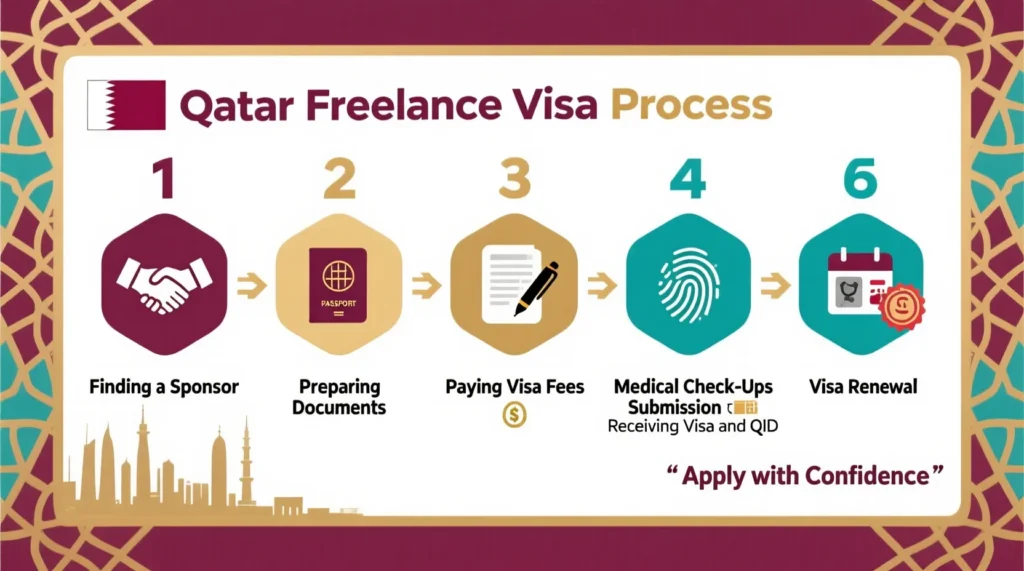
Step-by-Step Application Process
1. Finding a Sponsor
Even for freelance visas like Mustaqel or Azad, you usually need a Qatari sponsor or a licensed entity to endorse your application. The sponsor acts as your point of contact with the authorities and ensures your application complies with labor laws. Choose a reliable sponsor to avoid future problems.
2. Preparing and Gathering Required Documents
Collect all necessary paperwork, including:
- Passport with a valid expiry
- Educational certificates or professional qualifications
- Work portfolio or proof of previous freelance projects
- Bank statements showing financial stability
- Health insurance coverage
Having complete and accurate documents speeds up approval.
3. Negotiating and Signing Paperwork
Some visas require signing an official contract or agreement with your sponsor. Review all terms carefully, including fees, responsibilities, and any limitations on your work activities. Clear agreements prevent misunderstandings later.
4. Paying Visa Fees
Visa costs vary depending on the type:
- Mustaqel Visa may have higher fees due to long-term residency benefits
- Azad Visa is typically for short-term freelance projects and may be lower in cost
Fees can usually be paid via bank transfer, card, or online payment methods. Keep receipts for official records.
5. Medical Check-Ups
Applicants must undergo a health examination at approved medical centers in Qatar. Tests often include blood work, X-rays, and screening for communicable diseases. A clean bill of health is mandatory for approval.
6. Biometric Submission
Submit fingerprints and other biometric data as part of the official registration process. This ensures your identity is correctly verified for legal and security purposes.
7. Receiving the Visa and QID
Once your application is approved, you’ll receive your freelance visa along with a Qatar ID (QID). The QID is essential for opening bank accounts, signing contracts, and accessing government services.
8. Visa Renewal Process
Freelance visas are typically valid for 1–2 years, depending on the type. To renew, you must ensure all legal and financial requirements are met, update your health insurance, and sometimes reconfirm your sponsor. Timely renewal avoids fines, deportation, or interruptions in your work authorization.
Documents Required for Qatar Freelance Visa
To apply for a Qatar Freelance Visa, you need to provide several key documents that prove your identity, skills, and financial stability. Submitting complete and accurate paperwork ensures a smooth application process and minimizes delays.
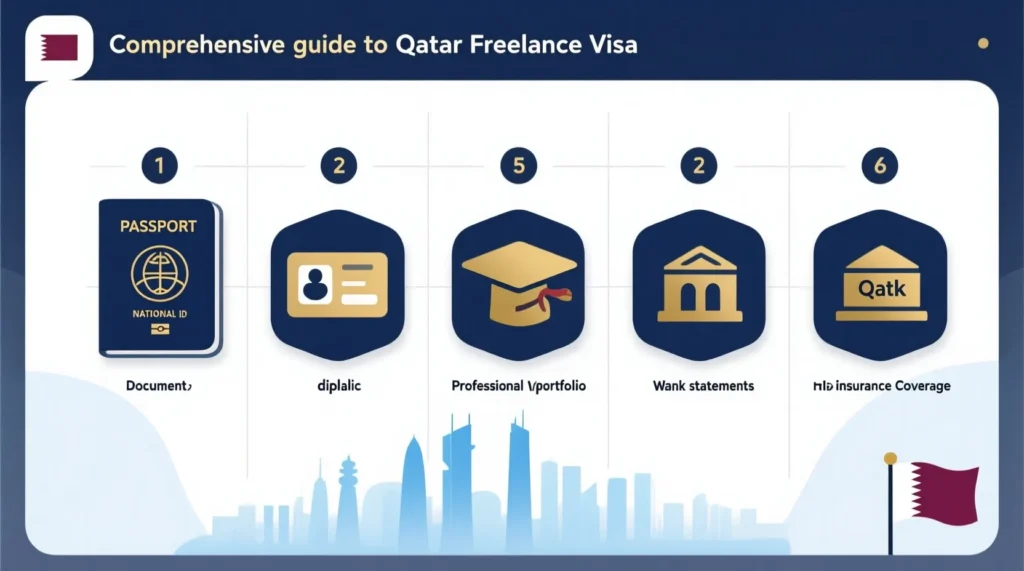
1. Passport and ID
A valid passport with at least six months of remaining validity is mandatory. Some visas also require a national ID or previous Qatari residence documents if you have stayed in Qatar before. Ensure your passport is free from damage and all personal details are correct.
2. Educational Certificates
Provide official copies of your degrees, diplomas, or professional certifications. These documents confirm your qualifications and are particularly important for sectors like IT, engineering, or consulting. Apostille or notarization may be required for foreign certificates.
3. Professional Portfolio or References
Freelancers must demonstrate their expertise. A portfolio of previous projects, client testimonials, or letters of reference from employers can strengthen your application. This shows authorities that you have relevant skills to work independently in Qatar.
4. Financial Documents
Applicants need to prove financial stability. Bank statements, proof of income, or contracts from clients can help establish that you can sustain yourself while living in Qatar. This is a key requirement to show you won’t face financial hardship.
5. Health Insurance Proof
Valid health insurance coverage is mandatory. Your policy should cover medical expenses in Qatar, including emergencies. Providing this ensures compliance with Qatar’s health regulations and protects both you and the state from unforeseen medical costs.
Costs and Fees of Qatar Freelance Visa
Applying for a Qatar Freelance Visa involves several fees that vary depending on the type of visa and whether you already hold a Qatar ID (QID). Understanding these costs upfront can help you budget accurately and avoid surprises during the process.
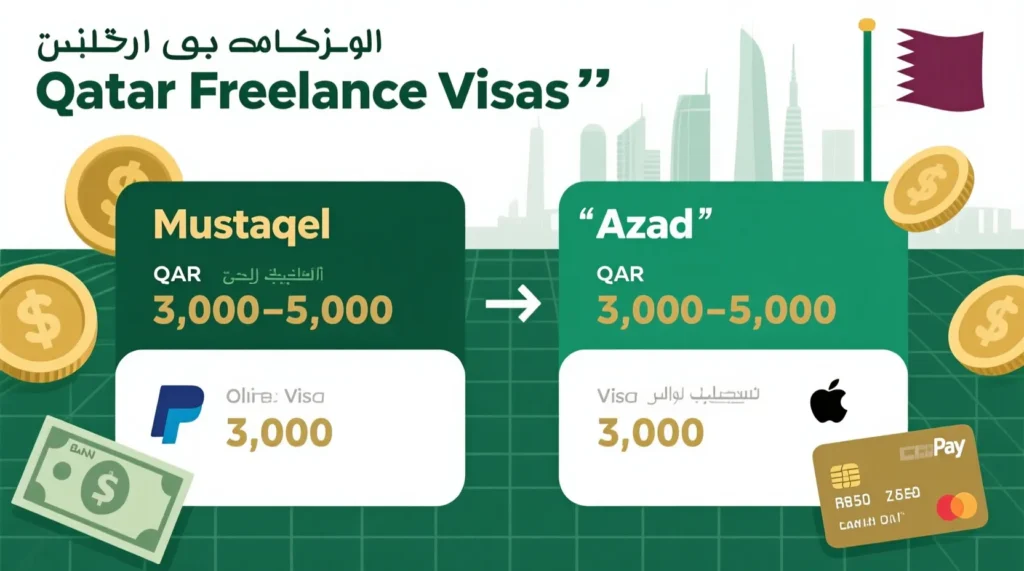
1. Without Qatar ID
If you are applying for the visa without an existing Qatar ID, the fees are usually higher. This covers not only the visa itself but also administrative processing, QID issuance, and registration with immigration authorities. For example, short-term freelance visas like the Azad Visa may start from QAR 5,000, while long-term options like the Mustaqel Visa can be higher due to extended residency benefits.
2. With Qatar ID
Applicants who already have a valid Qatar ID may pay reduced fees since part of the administrative process has already been completed. This can lower costs by a few thousand QAR, depending on the visa type. It’s worth checking the latest fee structure with official authorities to ensure accurate payment.
3. Other Associated Fees
Apart from the base visa fee, there may be additional costs for:
- Health check-ups and medical reports
- Biometric registration
- Document attestation or notarization
- Sponsor fees (if required)
Being aware of all potential charges helps you avoid unexpected payments and ensures a smoother visa approval process.
Budgeting carefully and keeping receipts for all payments is highly recommended, as authorities may request proof during the approval or renewal stages.
Benefits of Holding a Qatar Freelance Visa
Holding a Qatar Freelance Visa offers significant advantages for professionals who want to work independently while living in the country. One of the primary benefits is flexibility and independence. Unlike traditional employment, you can choose your clients, projects, and work schedule, allowing you to tailor your professional life to your personal goals.

Another key advantage is access to Qatar’s growing market. Freelancers in sectors like IT, design, marketing, and consulting can legally offer services to multiple companies and expand their business networks. This opens opportunities that are not available under standard work visas, where employment is tied to a single sponsor.
The visa also supports a better work-life balance. By controlling your workload and project selection, you can manage stress, avoid burnout, and allocate time for personal or family commitments.
For some visa types, like the Mustaqel Visa, holders may enjoy residency rights. This includes the ability to open bank accounts, sponsor family members, and access government services benefits that bring stability and long-term security to independent professionals living in Qatar.
Overall, the Qatar Freelance Visa empowers skilled individuals to work legally, grow professionally, and live comfortably in one of the Gulf’s most dynamic economies.
Legal Aspects and Risks
Understanding the legal framework is crucial for anyone considering a Qatar Freelance Visa. While the Mustaqel and Azad visa programs are officially recognized, freelancers must ensure they comply with all regulations to avoid serious consequences.
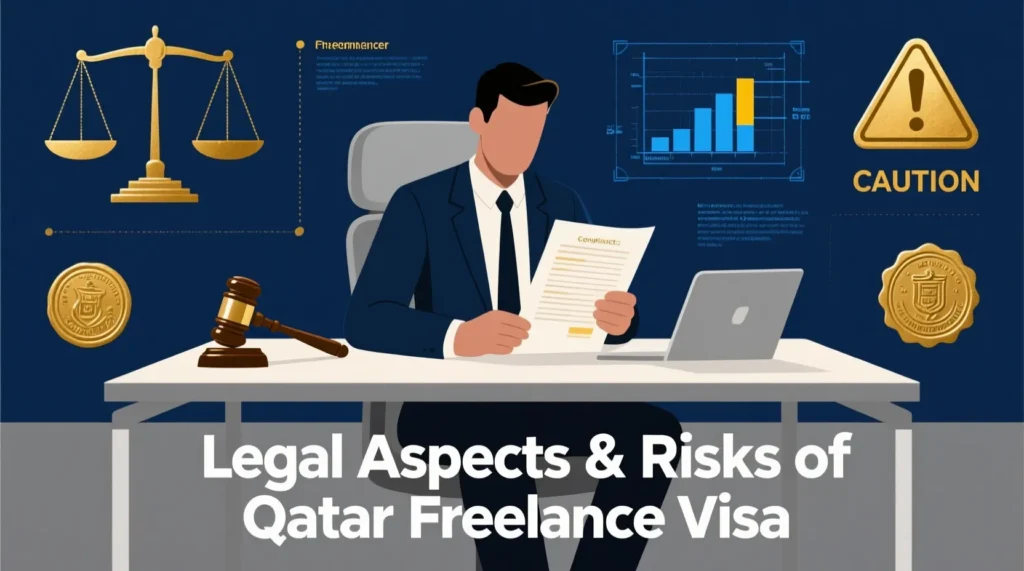
Is the freelance visa legal?
Yes, when applied through official channels, the Qatar Freelance Visa is fully legal. It allows independent professionals to work without being tied to a specific employer. However, working without a proper visa or under unofficial arrangements is considered illegal and can lead to severe penalties.
Labor law overview (Article 15)
Qatar’s Labor Law (Article 15, Law No. 4 of 2009) governs employment, sponsorship, and work authorization in the country. Freelancers must adhere to these regulations to ensure their work remains lawful. Unauthorized employment, even if temporary or informal, can violate this law and put both the individual and sponsor at risk.
Penalties for illegal work
Violating Qatar’s work laws carries strict consequences:
- Imprisonment: Freelancers caught working illegally may face jail time.
- Fines: Monetary penalties can be substantial, depending on the severity of the violation.
- Deportation and blacklisting: Individuals may be deported and barred from returning to Qatar for several years.
Risks for sponsors
Sponsors who engage in unofficial arrangements also face serious risks. They can be fined, penalized legally, or even lose their right to sponsor other employees. This makes it essential to ensure that any freelance work is conducted under officially recognized visa programs.
Being aware of these legal aspects and risks is critical. Following the official procedures not only protects you but also helps maintain a trustworthy professional relationship with your sponsor and the authorities.
Challenges Freelance Visa Holders Face
While the Qatar Freelance Visa opens many opportunities, holders may encounter several challenges that can affect their work and residency. Being aware of these issues helps freelancers plan ahead and avoid potential pitfalls.
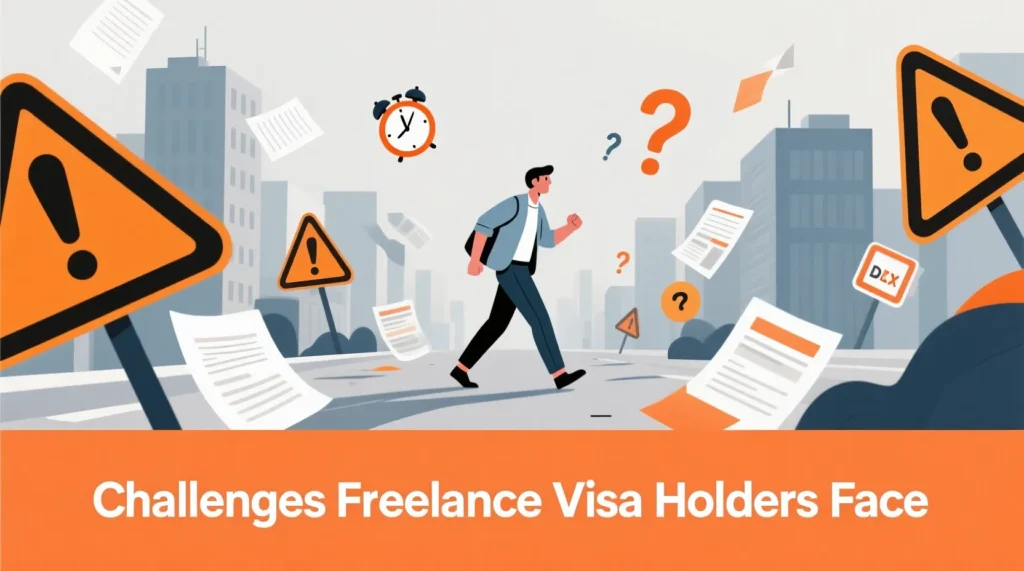
Problems with Unofficial Arrangements
Some freelancers attempt to work without going through official visa channels or rely on unofficial sponsors. This can lead to legal complications, fines, or even deportation. Unofficial arrangements may also leave freelancers without access to basic protections like labor rights or healthcare.
Financial Instability or Late Payments
Freelancers often face unpredictable income, especially when clients delay payments. Without the structure of a company, managing cash flow and sustaining living expenses in Qatar can be challenging. Proof of financial stability is required during the application process to mitigate these risks.
Issues with Visa Renewal and QID
Visa renewal and Qatar ID (QID) updates can be complicated if documents are incomplete or sponsor support is inconsistent. Delays in renewal may lead to fines, temporary loss of work authorization, or interruptions in accessing government services.
Sponsor-Related Problems
Some issues arise from unreliable sponsors, including delays in paperwork, miscommunication, or even financial exploitation. Choosing a trustworthy sponsor is crucial to ensure smooth visa processing and ongoing legal compliance.
Legal Alternatives for Freelancers in Qatar
For professionals seeking to work independently in Qatar while staying fully compliant with the law, there are several legal pathways. These alternatives provide security, reduce risks, and help freelancers operate without violating labor regulations.
Working Through Labor Supply Companies
One common option is to work via licensed labor supply companies. These companies hire freelancers officially and assign them to client projects. This ensures that you are legally employed while maintaining flexibility in choosing assignments. It also provides access to benefits like a valid QID, insurance coverage, and legal protection under Qatar’s labor law.
Secondment Agreements
A secondment agreement allows freelancers to work for a foreign or international company while being temporarily assigned to projects in Qatar. The original employer sponsors the visa, ensuring that the freelancer remains compliant with local labor regulations. This option is ideal for consultants and specialized professionals with ongoing international contracts.
Mustaqel/Azad Visa Pathways
The Mustaqel Visa and Azad Visa are official freelance visa programs introduced by Qatar. These visas allow independent professionals to work across multiple clients and sectors legally. The Mustaqel Visa offers long-term residency, family sponsorship options, and full access to government services. The Azad Visa, on the other hand, is generally for short-term freelance projects. Both programs provide a clear, legal alternative to working unofficially and help freelancers avoid fines, deportation, or blacklisting.
Tips for a Successful Qatar Freelance Visa Application
Applying for a Qatar Freelance Visa can be straightforward if you follow the right steps. Paying attention to details and preparing carefully increases your chances of approval and reduces delays.
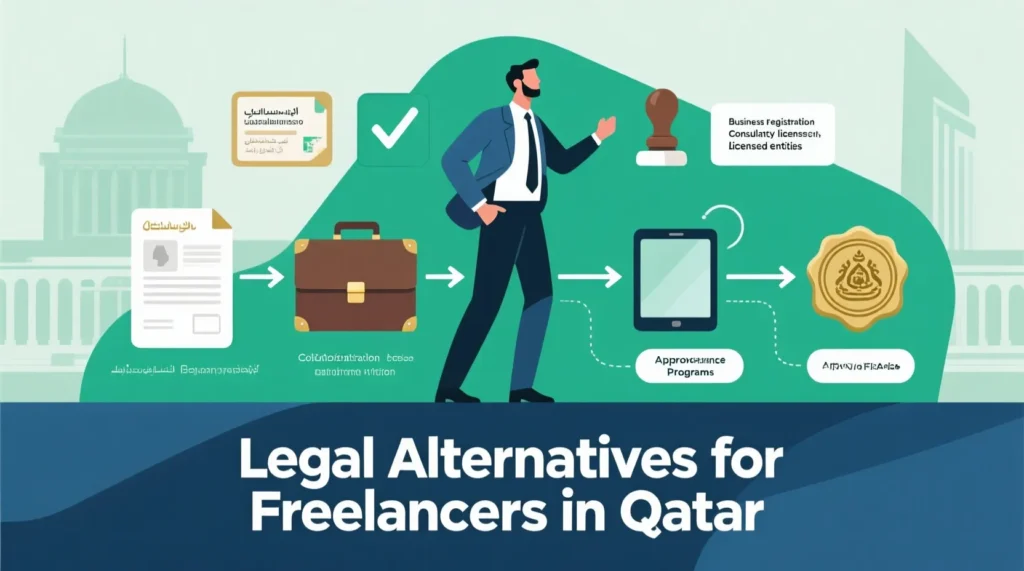
Preparing High-Quality Documents
Ensure all documents, including passport, educational certificates, professional portfolio, financial proof, and health insurance, are complete, accurate, and up-to-date. Any missing or inconsistent paperwork can delay your application or even lead to rejection.
Understanding Eligibility Thoroughly
Before applying, check if you meet all criteria, including profession, experience, in-demand skills, financial stability, and clean criminal record. Understanding the requirements ensures you don’t waste time or money on an ineligible application.
Demonstrating Financial Stability
Provide clear evidence of financial resources, such as bank statements or contracts with clients. Authorities want assurance that freelancers can support themselves while living in Qatar, making this a critical part of your application.
Following Official Process Strictly
Always apply through official channels and follow the step-by-step procedure. Avoid shortcuts or unofficial arrangements, as these can lead to fines, deportation, or blacklisting. Stick to guidelines provided by Qatari authorities for each visa type.
Seeking Professional Guidance If Needed
If you are unsure about any step, consulting with legal experts or licensed sponsors can save time and reduce risks. Professional guidance is particularly useful for complex cases, like Mustaqel Visa applications or secondment arrangements.
Frequently Asked Questions (FAQs)
How can I get a freelance visa in Qatar?
To get a freelance visa, you need to choose the right program (Mustaqel or Azad), find a licensed sponsor if required, prepare all documents (passport, certificates, portfolio, financial proof, health insurance), pay the visa fee, complete medical and biometric checks, and submit your application through official channels.
Who is eligible for a freelance visa?
Eligibility depends on your profession, experience, and sector. Applicants should have in-demand skills, professional experience or education, financial stability, health insurance, and a clean criminal record. Certain sectors like IT, design, media, marketing, and consulting are highly favored.
How much is Qatar freelance visa?
Visa fees vary depending on the type and whether you have a Qatar ID. The Azad Visa typically costs around QAR 5,000 without a QID, while the Mustaqel Visa is higher due to long-term residency benefits. Additional fees may apply for medical tests, biometrics, or sponsor services.
Is freelancing legal in Qatar?
Yes, freelancing is legal if done through official programs like the Mustaqel or Azad visa. Working without proper authorization or under unofficial arrangements is illegal and can lead to fines, deportation, or blacklisting.
What is the salary of a freelancer in Qatar?
Freelance income varies widely depending on skills, sector, and client base. IT and digital marketing professionals can earn from QAR 8,000–15,000 per month, while experienced consultants or specialized freelancers may earn higher amounts depending on contracts.
How much is a 2-year work visa in Qatar?
A standard 2-year work visa in Qatar, issued for traditional employment, usually costs between QAR 5,000–10,000 depending on the employer and sector. Freelance visa fees differ, especially for long-term programs like the Mustaqel Visa.
How much do Pakistani freelancers earn in Qatar?
Pakistani freelancers in high-demand sectors like IT, design, and digital marketing typically earn between QAR 6,000–12,000 per month, depending on experience, skill level, and client base. Rates may vary for short-term or project-based work.
Is freelancing free to join?
No, freelancing in Qatar requires a valid visa and legal authorization. There are visa fees, medical tests, and other administrative costs that must be paid. Attempting to work without a legal permit is illegal.
How long does it take to get a freelance visa?
The process usually takes 2–6 weeks, depending on visa type, completeness of documents, medical exams, and sponsor processing. Delays may occur if paperwork is incomplete or additional verification is required.
Final Words
The Qatar Freelance Visa opens a world of opportunities for skilled professionals seeking independence, flexibility, and access to one of the Gulf’s most dynamic markets. By following the official procedures, preparing high-quality documents, and understanding eligibility requirements, freelancers can work legally and securely while avoiding penalties or complications.
Choosing the right visa pathway whether the Mustaqel Visa, Azad Visa, or legal alternatives like labor supply companies ensures long-term stability, access to essential services, and professional growth. Always plan ahead, demonstrate financial stability, and seek guidance when needed to maximize your chances of success.
With careful preparation, a clear understanding of labor laws, and commitment to legal compliance, you can enjoy the benefits of freelancing in Qatar while building a sustainable and rewarding career. Take the first step today, and make your freelance journey in Qatar both safe and successful.
